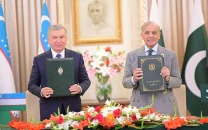Still Re(a)d
Shamim Manzar talks about similarities between Urdu and German, Pakistan’s idealist Marxists.

Still Re(a)d
“Why would you want to interview me? I’m an old man, what do I know?” he says before I even begin to put my first question to him. I beg to differ.
Born in Karachi on December 25, 1955, Manzar is among the few Pakistanis who can speak fluent German. After completing a Masters in International Relations from Karachi University, he went to Germany for a two-year training programme and joined the Goethe-Institut in 1987.
Over the years, his grasp on the language has made him well-known in Urdu literary circles for his German-to-Urdu and Urdu-to-German translations as well as his original fiction work. His first book, titled Tanhai Ka Ek Din, was published in 2003 and is a collection of his Urdu short stories. Five years later, he published his first novel titled Zawaal Se Pehlay and is now working on his as yet unnamed second novel.
“I wish I could spend more time with my family and work on my novel. I’m so sick of these conferences,” complains Manzar, as he apologises for making me wait a few minutes before he could talk to me. A veteran in the field, he is preparing to attend a conference in Munich, Germany and had been on the phone working out the details.
As the interview progresses, we discuss his love for German literature and he mentions Hermann Hesse, Heinrich Böll and Uwe Timm as some of his personal favourites, explaining how their style has influenced him to write his first novel.
The novel starts off in a hospital where the protagonist is paralysed with brain haemorrhage. As he stares at his surroundings, he is constantly reminded of his days as a young Pakistani Marxist in the late 1960s. Confined to his bed, he is haunted by the loss he felt when many of his comrades abandoned him as time went by.
The novel, as he narrates it, is a surreal journey for the reader. Memories converge together, blurring the line between the past and the present, questioning the very existence of being. These are common traits in all of Manzar’s work.
“He has been staring at the ceiling for too long now. Any form of interference will disturb his serenity any moment. He is constantly listening to the ambience of his surroundings but all the sounds are now converging into a single entity and are piercing into his brain...
‘It is red, it is red… Asia is red now’,” he writes in Zawaal Se Pehlay.
As he shares some fond memories of his youth and his revolutionary past, it appears to me as if this novel is more than a little autobiographical. As if he has drawn on his own life as a young Marxist in Pakistan for inspiration. “Things were a lot better back in those days [the 60s and 70s],” he reminisces, as his eyes light up with enthusiasm. “We were sort of idealists in those days and our idealism was to reach the destination assigned by Karl Marx, but this dream never came true.”
The Marxist dream may not have materialised, but something positive did come out of the entire experience for Manzar. It was during this time that he developed an interest in literature and the German language.
As he takes quick sips of tea, he tells me about the structural similarities between the German and Urdu languages. “When I translate, I don’t feel any difficulty because the structure of German language is very similar to the structure of Urdu language, so I can describe quite easily the feelings of the character,” he explains.
“In German and Urdu, you can interchange or place the verb any way you want while in English, that is entirely impossible,” Manzar says.
In 2010, he translated Friedrich Schiller’s epic play The Robbers into Urdu, and in 2012, he went on to translate a selection of Faiz Ahmed Faiz’s poems into German. This feat has earned him a quite a respectable position among the Urdu literati.
As he plans more translations, Manzar says that translation of Urdu works, particularly into English, is one way that Urdu literature can be preserved.
“The future [of Urdu literature] is very bright but there is a problem. [Works of] Pakistani writers are not being translated to foreign languages. This is why their fame never crosses borders,” he says.
When I ask him what compels him to continue writing in Urdu, despite the lack of reach, he insists it is not about fame. “I’m not keen on becoming famous or anything … the question is why do we write? Maybe we want to say something but we can’t say it, maybe we are scared of saying it or speaking about it, so we use the pen,” he concludes.
Published in The Express Tribune, Sunday Magazine, July 29th, 2012.



















COMMENTS
Comments are moderated and generally will be posted if they are on-topic and not abusive.
For more information, please see our Comments FAQ